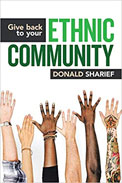
 |
Author Sharief makes an impressive plea: share with your ethnic community when you achieve success instead of keeping your blessings for yourself. He cites such examples as Harriet Tubman, who, after she escaped slavery, immediately began helping others to do the same. Yet today, many young African Americans are not being taught about her or other similar heroes such as Elijah Mohammed, who not only helped Muslim causes but also supported churches and promoted Ebony magazine when it was slipping in sales.
Sharief urges African Americans who move ahead to provide their local and similar communities with needed resources. No one should have to go to food banks when there is enough money to support all. Living in a morally righteous way and using positive language when speaking to the needy are other useful strategies. One essential piece of this wider problem is supporting politicians who hold the people's needs foremost. Even those with less can assist those who are struggling. Charity belongs to all religions.
Sharief, who has authored works on similar subjects, writes with considerable verve. He underpins his general thesis with many pertinent personal examples of people he has known and situations he has participated in or observed. This short, lively work offers a variety of practical solutions to problems large and small that negatively affect ethnic communities and individuals. It carries a basic religious message but does not proselytize for any specific sect. Though the book needs more meticulous editing, it can perhaps best be read as a sermon, delivered in bursts of high energy and calm reflection that give its ideas a distinctive impact. The principles Sharief propounds are meant to reach people of all ethnicities and speak to the ideal of a world free of rampant greed.